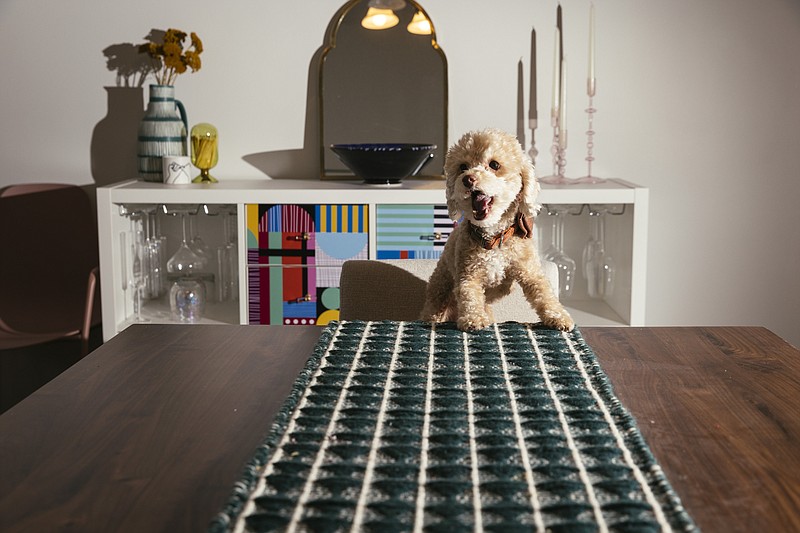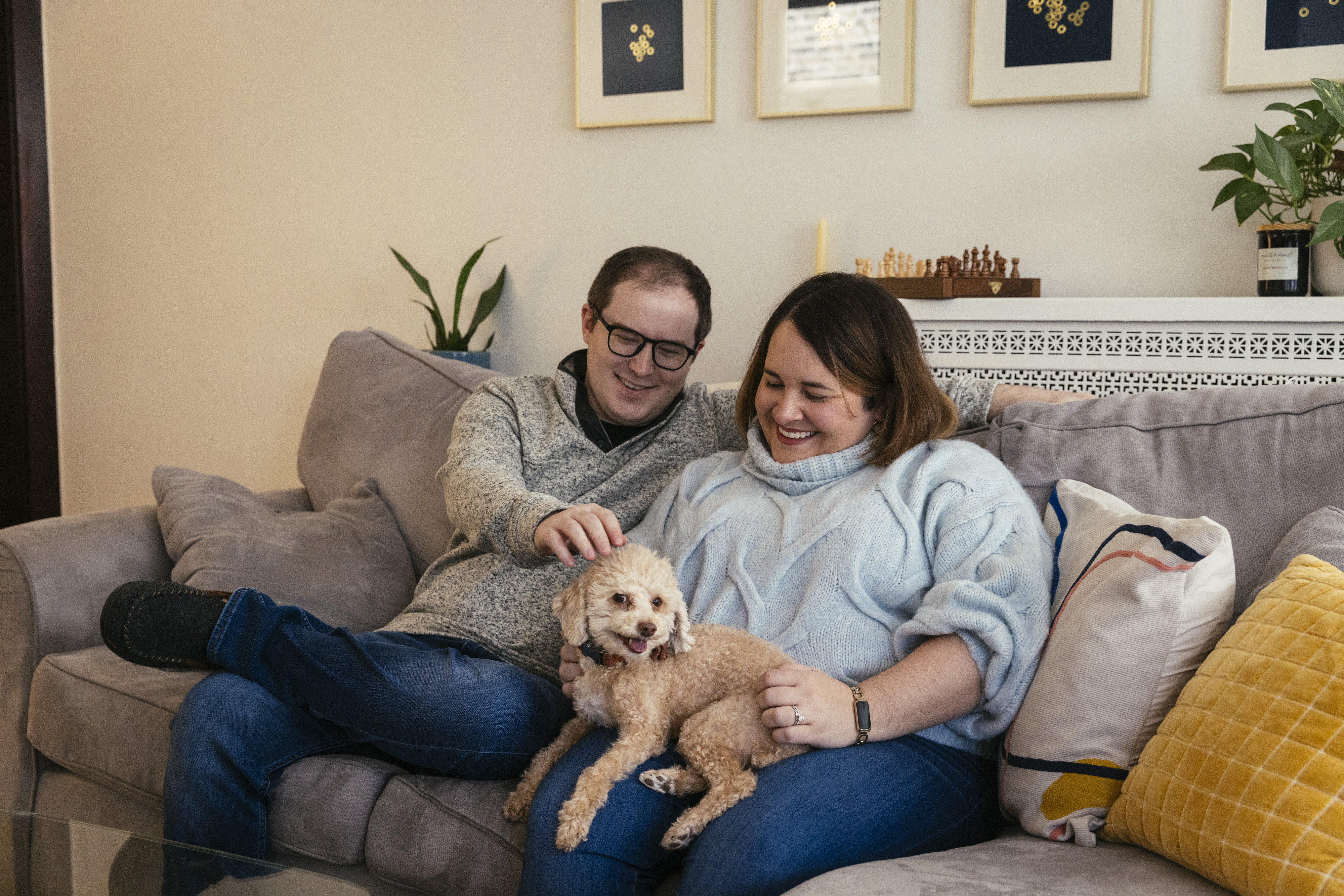It had been a year since Henry's last haircut, and Michelle Holbrook did not realize that her 7-pound, goofy toy poodle was now almost 9 pounds. His cute, shaggy look not only obscured his weight, it also made it harder for the Holbrooks to resist his begging.
"He's a little rascal," said Holbrook, a medical researcher in Chicago. "He'll hear me when I open the cheese drawer in the fridge, and he comes running."
Henry, 7, is one of many food-motivated pets who have surprised their owners with their weight gain in the past two years. While veterinarians and pet owners mostly attribute the added pounds to an increasing urge to give into bad habits during the coronavirus pandemic, pet obesity has long been an issue in the United States.
Banfield Pet Hospital, which runs more than 1,000 veterinary clinics in the country, found that nearly 40% of cats and almost 35% of dogs were diagnosed as overweight in 2020, up from less than 20% a decade ago. Banfield also saw a slight rise - about 2% - of dogs being diagnosed as overweight from March 2020 to December of that year, at the beginning of the pandemic.
"We're all having pandemic pounds come into play," said Dr. Jennifer Bolser, chief clinic veterinarian for the Humane Society of Boulder Valley, in Colorado. For pets, as with humans, bad habits include overeating, too much snacking and not enough physical activity. People find it harder to not overindulge pets while stuck at home with them.
Anthony Osuna, a psychology resident, said he and his partner used to take Pavlov, their petite corgi, to dog-friendly beaches, malls and restaurants in Southern California. But when the pandemic shut things down, Pavlov, 6, lost enthusiasm for outings - even walks.
"I felt like we were disappointing him," Osuna said. "That contributed to a lot of humans' weight gain - the additional snacks and the dessert and the boba and the coffee that you would do just to make yourself feel better in the pandemic. And with him as well. We would buy him treats, we would give him snacks."
Pavlov's weight crept up to about 28 pounds, from 23, prompting Osuna to reduce his portions and restrict snacks (popcorn is a favorite).
"He didn't look really fat," Osuna said. "But with the additional snacks and the reduced activity, it all added up."
John Owen, a retired contract manager in Boulder, Colorado, who has fostered more than 150 cats over the past decade, said he had to introduce a much stricter diet for his own cat, Vita. He was used to leaving food out for her and her sister Ginny all day, allowing them to come and go. But Vita, 3, began to overeat.
"She went from about 15 pounds to 19 pounds - gigantic," Owen said. "Of course, I put on pounds during the pandemic. But that's neither here nor there."
He put Vita on carefully portioned dry food. He also left Ginny's meals on the counter, which Vita - who is not as fit - cannot reach. But she protested her diet.
"She gets very affectionate," Owen said. "She tries to make me break down."
A survey of pet owners by Pumpkin, a pet insurance company, and Fi, which makes smart dog collars, found that more than 50% of dogs that gained weight during the pandemic did so alongside their owners - some even when they were more active. A number of studies have also found that humans and dogs can mirror one another's emotions and stress levels.
Rachel Kiri Walker, who lives in Los Angeles, said she was "very depressed" at the beginning of the pandemic. Then a breakup prompted her then-boyfriend to move out, separating her dog, Senator Bucky, 5, from his dad.
"Anytime that I would be crying, he would come up and lick my face and be extra cuddly," Walker said. "It's amazing that a creature can be that intuitive."
But she recognized that Bucky was also stressed after he urinated on furniture - deliberately, she said, which he had not done before.
His potential stress, along with extra bone marrow treats and table scraps, probably contributed to his rapid 10-pound gain, Walker said. A fluffy Border collie and golden retriever mix, Bucky is now about 45 pounds.
Symptoms of stress and anxiety in dogs can vary. In a 2018 study published in The Journal of Veterinary Behavior, more than 80% of the owners observed thought their dogs displayed signs of emotional eating, or "stress eating" behavior when they were "unhappy."
As owners return to pre-pandemic routines, pets can develop anxiety from other sources. Henry, Holbrook's toy poodle, has developed separation anxiety when his owners leave for work. Other dogs have had limited socialization during the pandemic, leaving them unable to have healthy interactions with people and animals in what were once typical activities.
Walker said that Bucky, who is otherwise calm, had become possessive about her when other dogs tried to say hello. When she began taking Bucky on hikes to help him shed pounds, she found that he was also excited to encounter and play with other dogs.
But when it comes to weight loss, Bolser said that as with people, it is harder for pets to lose pounds than it is to gain them. More walks cannot always counteract indulgent foods.
When Dr. Preeti N. Malani, an infectious disease specialist who is the chief health officer at the University of Michigan, adopted an English Labrador during the pandemic, she was surprised by how difficult it was to discourage antics like breaking into a neighbor's house to eat their dog's food and sniffing out pizza crusts that students had discarded on campus.
"They're vacuum cleaners," Malani said of Labradors like Sully, her puppy. She has kept him lean by refusing to provide snacks other than fruits and vegetables and by enrolling him in a day care that keeps him active, social and stimulated while she is at work.
"The pandemic is one of those situations where you just have to be even more thoughtful," Bolser said, adding that owners should plan for their pets' long-term health. "Preventing obesity will prevent and help minimize a lot of other health conditions."
So when a visit to the veterinarian alerted Holbrook and her husband to Henry's increased weight, they knew which habits needed adjusting.
"I found out that part of my husband's morning routine - because he thinks it's so cute - is he'll put five Cheerios in Henry's bowl," Holbrook said. "It started out as five, and now it's a small handful."
"I'm like, 'John, you have to stop,'" she said. "He's getting so spoiled."
This article originally appeared in The New York Times.

